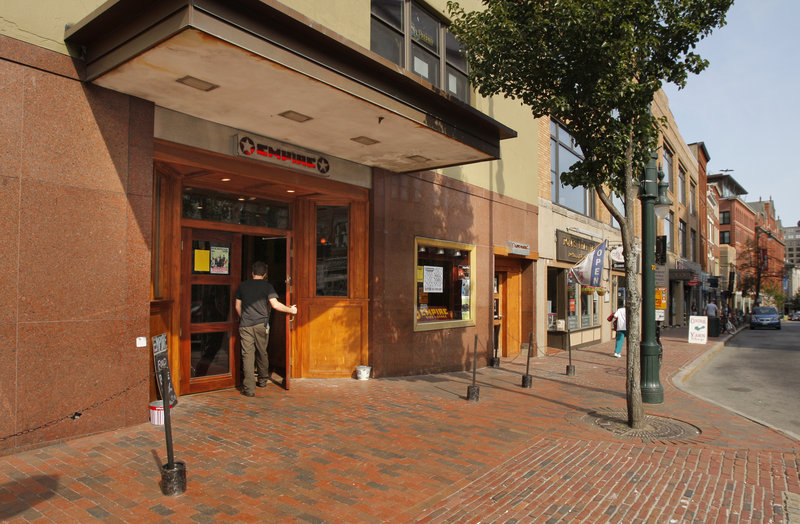A national organization that collects royalty payments for songwriters has sued 21 nightclubs across the country, including one in Portland.
Empire Dine and Dance, a popular restaurant and performance space on Congress Street, is named in the lawsuit, which claims it failed to sign a licensing agreement and pay annual fees for the performance of copyrighted material.
The lawsuit, seeking $13,280 in unpaid fees, was filed by the American Society of Composers, Authors and Publishers, one of three U.S.-based organizations that collects royalty fees from venues that offer live and recorded music. The other two are BMI and SESAC.
“We only do this as a very last resort,” said Vincent Candilora, ASCAP’s head of licensing. “They’ve ignored us for a pretty long period of time.”
Empire Dine and Dance opened in December of 2007. According to Candilora, ASCAP has been trying unsuccessfully to get the establishment to sign a licensing agreement since May of 2008.
Todd Doyle, co-owner and general manager of Empire Dine and Dance, said he first heard of ASCAP when he was served with the lawsuit on Friday.
“We really thought we were paying BMI and that we were covered,” Doyle said. “Then ASCAP came in, and they want a piece of the pie.”
ASCAP, the largest of the three performance-rights organizations, distributes the fees it collects to more than 380,000 members after deducting 11 percent for operating expenses. Those members, ranging from Top 40 artists to local musicians, hold the copyrights to more than 8.5 million songs.
Whenever that music is played publicly – whether it’s at a concert hall, a coffee shop, a high school or a church basement – copyright law requires the venue to hold a performance license.
Doyle questions the amount of money ASCAP says it’s owed by Empire Dine and Dance. “It seem incredibly unfair, especially considering the amount of local music we do,” he said.
ASCAP says it calculates licensing fees based on factors including whether the venue offers live or recorded music and whether it collects a cover charge. The frequency of performances and the size of the venue is also taken into account.
ASCAP calculates that Empire Dine and Dance should pay an annual licensing fee of $4,478. The club offers music seven days a week, including live bands, karaoke nights and tribute competitions called “Clash of the Titans.”
“ASCAP doesn’t exist just so the big, huge artists get paid or to squeeze money out of small businesses in hard economic times,” said Patrick May, president of the Portland Music Foundation and the Northeast booking agent for Skyline Music. “It exists so its members get paid. If it didn’t exist, then there would be no value for music.”
While he disputes the assessed licensing fee, Doyle doesn’t argue with the concept of royalties of songwriters.
“The artists who wrote those songs have the right to earn royalties,” he said. “We totally support that. It just needs to be done in a fair and just manner.”
Down Congress Street at Port City Music Hall, owner Rob Evon pays two licensing fees to ASCAP, to cover the recorded music that’s played in the lounge and the live music that’s played on the stage.
“At this point, I’m working specifically with ASCAP, largely because they have the largest catalog of recorded music and have most of the stuff that will ever be played on my stage,” Evon said.
For a concert that draws 550 people to Port City Music Hall, the licensing fees are about $40 to $50, Evon said.
Evon said the performance-rights organizations have become more aggressive in recent years as music downloads and file sharing have eroded sales of CDs.
“Once the recorded music industry started to falter, those artists began looking for revenue elsewhere,” Evon said. “Hence the shakedown of the music venues. It’s a shift in where artists’ money comes from in the business.”
Doyle said he intends to work with ASCAP to resolve the issue, and hopes he can negotiate a lower licensing fee.
Based on his knowledge of cases filed against other clubs, May, of the Portland Music Foundation, predicted that the case will be settled out of court.
“We’d be happy to settle this with them rather than have it go to trial,” Candilora said. “I don’t know that we’ve ever lost a lawsuit. The law is pretty clear.”
Staff Writer Avery Yale Kamila can be contacted at 791-6297 or at: akamila@pressherald.com
Send questions/comments to the editors.


